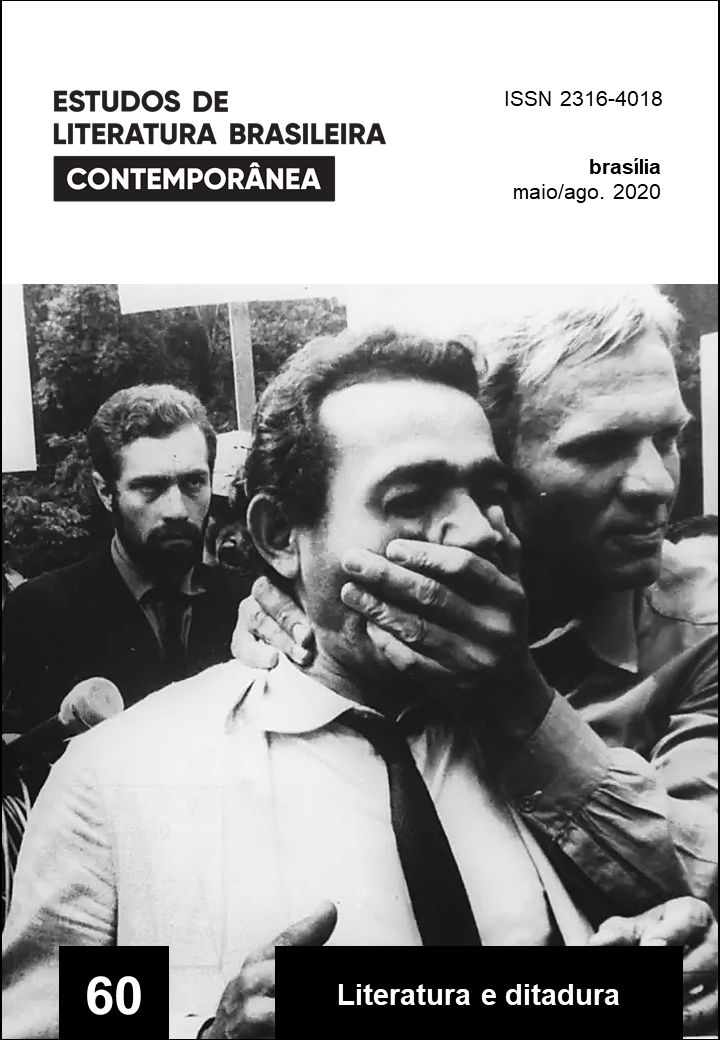From Concealment to Diffracted Memory: The Writing of Resilience in Palavras cruzadas, by Guiomar de Grammont
DOI:
https://doi.org/10.1590/2316-4018607Keywords:
Palavras cruzadas, resilience, memory, utopiaAbstract
This article focuses on a journey of resilience in the wake of historical trauma through a reading of Palavras cruzadas (2015) by Guiomar de Grammont, a novel that unearths the shadows and clandestine phantoms of the Araguaia guerrilla, not only to remove them from silence but also to restore them in the individual and collective memory. Alternating narrative voices with distinct historical temporalities, the narrative is permeated by the conviction that the past that is not past jeopardizes the mourning process and riddles the present with unresolved guilt. The quest undertaken by the disappeared’s sister to exorcise the pain of his disappearance revives his journey to the heart of the verdant fortress and reveals his utopian ideal in the face of the contradictions of the armed struggle and the tragic fate of the guerrillas.
Downloads
References
BONASSI, Fernando (2003). Prova contrária. Rio de Janeiro: Objetiva.
CHEVALIER, Jean; GHEERBRANT, Alain (1990). Dicionário de símbolos. Tradução de Vera da Costa e Silva et al. Rio de Janeiro: José Olympio.
COSTA, Carlos Augusto Carneiro (2016). Ficção e guerrilha do Araguaia: elementos revisionistas no romance Palavras cruzadas de Guiomar de Grammont. Literatura e autoritarismo. Santa Maria, v. 16, p. 35-48, mar. Disponível em: https://periodicos.ufsm.br/LA/article/view/21503/13026. Acesso em: 15 out. 2018.
CYRULNIK, Boris (2002). Un merveilleux malheur. Paris: Odile Jacob.
FIGUEIREDO, Eurídice (2017). A literatura como arquivo da ditadura brasileira. Rio de Janeiro: 7Letras.
GENETTE, Gérard (1987). Seuils. Paris: Éditions du Seuil.
GRAMMONT, Guiomar (2015). Palavras cruzadas. Rio de Janeiro: Rocco.
GRAMMONT, Guiomar (2016). Guiomar de Grammont e as palavras que se cruzam. [Entrevista concedida a] Tiago Ribeiro. Mafuá. Florianópolis, n. 25. Disponível em: https://bit.ly/2UqZy1h. Acesso em: 10 set. 2019.
GRAMMONT, Guiomar de (2017). Les ombres de l’Araguaia. Traduzido por Danielle Schramm. Paris: Métailié.
KUCINSKI, Bernardo (2015). “Palavras cruzadas” revela crueldade da guerrilha do Araguaia. O Estado de S. Paulo, São Paulo, 26 set. Disponível em: https://bit.ly/2xz5TyC. Acesso em: 30 ago. 2019.
LEHNEN, Leila (2007). O retorno do reprimido: ditadura, memória e capital em Prova contrária, de Fernando Bonassi. Caderno de Letras da UFF, n. 33, p. 87-103. Disponível em: https://bit.ly/3bDRbVE. Acesso em: 21 jan. 2020.
LISBOA, Adriana (2012). Azul corvo. Lisboa: Quetzal Editores.
MAVRIKAKIS, Catherine (2004). Nos mnémosynes modernes. Spirale, Montreal, n. 194, p. 28-29, jan./fev. Disponível em: https://id.erudit.org/iderudit/18374ac. Acesso em: 13 set. 2019.
PADURA, Leonardo (2011). L’homme qui aimait les chiens. Tradução de René Solis e Elena Zayas. Paris: Métailié.
RICOEUR, Paul (2003). La mémoire, l’histoire, l’oubli. Paris: Seuil.
ROBIN, Régine (2003). Présences du passé. In: ROBIN, Régine. La mémoire saturée. Paris: Stock. Disponível em: https://bit.ly/2UqgaGi. Acesso em: 13 set. 2019.
SEMPRÚN, Jorge (2012). Le fer rouge de la mémoire. Paris: Gallimard.
TODOROV, Tzvetan (1994). Face à l’extrême. Paris: Seuil.
TODOROV, Tzvetan (2000). Mémoire du mal tentation du bien. Paris: Robert Laffont.
VECCHI, Roberto (2014). O passado subtraído da desaparição forçada: Araguaia como palimpsesto. Estudos de Literatura Brasileira Contemporânea, Brasília, n. 43, p. 133-139, jan./jun. Disponível em: https://bit.ly/3aFmxvn. Acesso em: 30 out. 2018.
Downloads
Published
How to Cite
Issue
Section
License
Authors who publish in this journal agree to the following terms:
a) The authors maintain the copyright and grant the journal the right of first publication, the work being simultaneously licensed under the Creative Commons Attribution License-Non Commercial 4.0 which allows the sharing of the work with acknowledgment of the authorship of the work and publication this journal.
b) Authors are authorized to enter into additional contracts separately, for non-exclusive distribution of the version of the work published in this journal (eg publish in institutional repository or as a book chapter), with authorship recognition and publication in this journal.
c) Authors are allowed and encouraged to publish and distribute their work online (eg in institutional repositories or on their personal page) after the editorial process, as this can generate productive changes, as well as increase the impact and citation of published work (See The Effect of Free Access).
d) The authors of the approved works authorize the magazine to, after publication, transfer its content for reproduction in content crawlers, virtual libraries and the like.
e) The authors assume that the texts submitted to the publication are of their original creation, being fully responsible for their content in the event of possible opposition by third parties.


